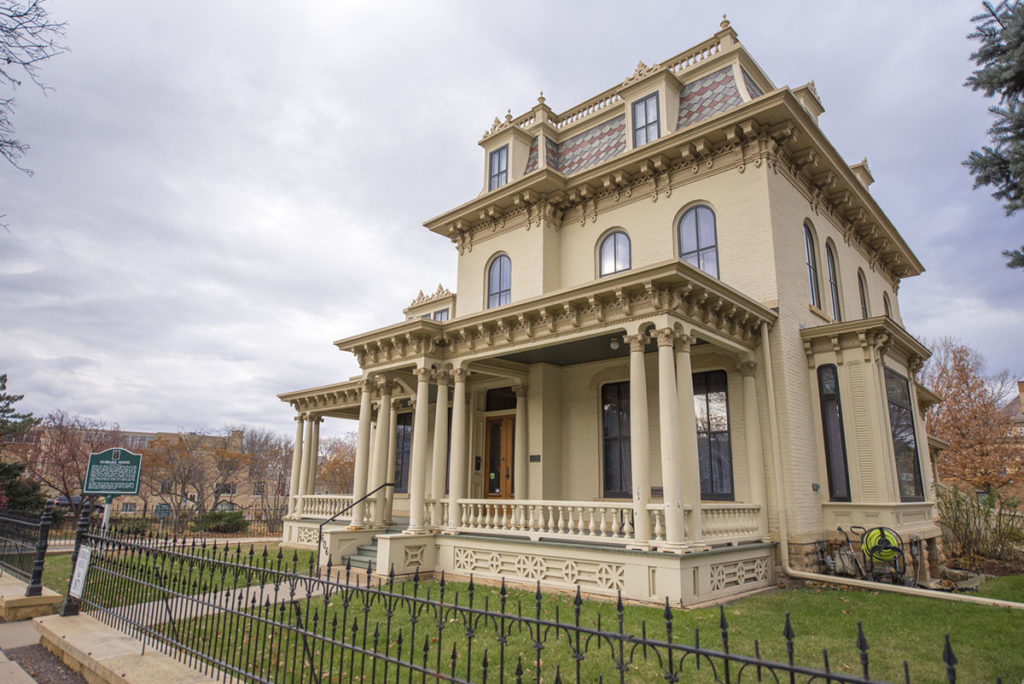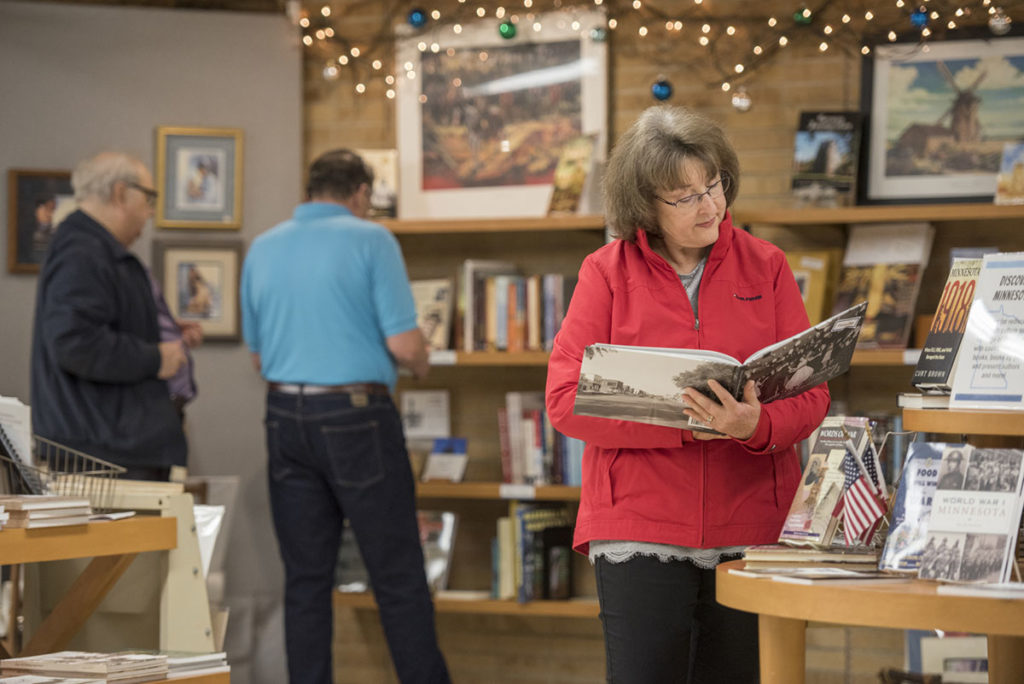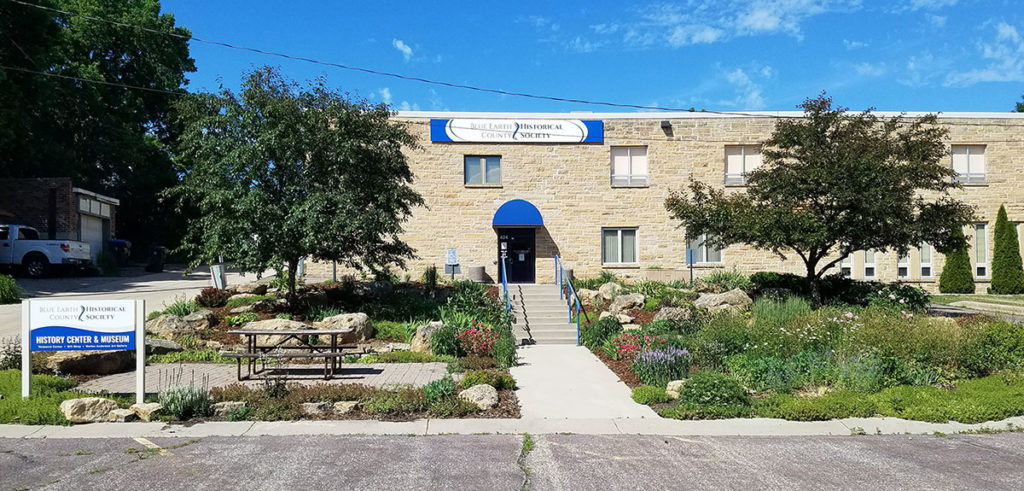A few decades after the Blue Earth County Historical Society’s founding in 1901, the world was engulfed in the flu epidemic of 1918.
BECHS obtained and archived some of the artifacts of that epidemic — artifacts that were part of a display from July through November 2018, when no one foresaw that a century later the Society would again be collecting pandemic artifacts such as face masks.
Shelley Harrison, Historical Society curator and archivist, pointed out that items we use today, even ordinary, everyday objects such as kitchen utensils, are the historical artifacts of the future.
BECHS Mission:
to lead in the collecting and promoting of Blue Earth County’s history and to ensure its preservation for the enrichment and benefit of present and future generations.
Blue Earth County Historical Society is a member-supported nonprofit whose mission statement is “to lead in the collecting and promoting of Blue Earth County’s history and to ensure its preservation for the enrichment and benefit of present and future generations.”
The organization, overseen by a volunteer board, operates two locations—the History Center, which houses a museum, a gift shop, a research center and archives, and the historic R.D. Hubbard House.

With a staff of four, BECHS relies on volunteers for a variety of tasks such as gardening, data entry, clipping and filing of obituaries, as well as taking part in programs such as Ghosts from the Past and Christmas at the Hubbard House.
The Society’s history dates to 1901, when a group of residents organized as part of a semi-centennial celebration of the settling of Mankato and Blue Earth County. A constitution was written, and the five-day event featured exhibits as well as public readings.
Beginning of growth
After years of relative inactivity, in 1938 BECHS took a large step with the purchase of the R.D. Hubbard House using money donated by a Hubbard neighbor, Judge Loren Cray, for the purpose of obtaining a permanent museum location.
Ownership of the house was then transferred to the City of Mankato with the agreement that the city would maintain the house for the Society to use as a museum. As the Society grew, it placed historical markers around the county and worked to get historically significant sites added to the national register.
The Society eventually outgrew the Hubbard House and in 1988 had the opportunity to move to the former Catholic Newman Center at 424 Warren St., sharing it with another non-profit organization. BECHS’ space became the Heritage Center, including an exhibit gallery, archives, research center and offices.

Under the direction of local architect Linda Nussbaumer, the Hubbard House interior was restored to early 1900s decor.
When the non-profit organization that shared the building relocated, BECHS expanded into the space, enlarged its gift shop, and began to exhibit items such as limited edition prints by local artist Marian Anderson.
Taking advantage of the down time in 2020, recent improvements (funded through an Edward McLean Legacy gift and private donations) include asbestos abatement, a drop ceiling with new lights, carpeting and paint throughout, and new technology, including in meeting rooms.
Smitten with history
As might be expected, all four staff members are seriously interested in history—but some have come to that interest later in life.
Jessica Potter
Executive Director Jessica Potter’s interest began in college. Dealing with primary research sources, she fell in love with the research aspect of being a historian. In 1995, she earned a BA degree in history, with minor studies in political science and English literature.
I love seeing history all around me—in buildings, in the landscape and in family names—how all the pieces fit together to weave our story.Jessica Potter
In 1997, Potter was hired as the curator and archivist at the Nicollet County Historical Society, where she worked until 2001, when she was hired by BECHS. She has worked as a curator, archivist, educator, exhibit technician and coordinator of volunteers.
Delighted with the historical surroundings in Blue Earth County, she said, “I love seeing history all around me—in buildings, in the landscape and in family names—how all the pieces fit together to weave our story. I’m committed to helping everyone who interacts with BECHS to feel a strong, personal connection to the community and to the history that surrounds them.”
Shelley Harrison
Curator and archivist Shelley Harrison, who grew up in Le Sueur County, has always enjoyed history. She explained, “My grandparents had a Century Farm, and my family took vacations to historical sites in many states. In every place, there are sparks of what happened before, not just at Independence Hall in Philadelphia.”
Harrison earned a BS degree in anthropology, with minors in museum studies and archaeology. She was enrolled in a master’s program in public history when Potter, whom Harrison had met while volunteering at the Nicollet County Historical Society, asked her to work at BECHS in 1999. Harrison is responsible for 100,000 archived items, from hats to fire trucks. She enjoys “solving a lot of little mysteries,” including one that came her way when President George W. Bush scheduled a speech near Mankato when running for reelection.
“In August 2004, we got a call from one of President Bush’s speechwriters at the White House, asking who the last sitting president to visit Mankato had been,” Harrison said. “I looked in the Politics and Legislative file of newspaper clippings and found the answer in two hours—Harry S. Truman. President Bush did use that information when he spoke in Mankato.”
Heather Harren
Communication and Archives Manager, Heather Harren, was passionate about history from a young age. She earned a BS degree in history, and while pursuing an MS in history and nonprofit leadership at Minnesota State University, Mankato, she worked as a graduate assistant in the University archives. She began her BECHS career as the archives assistant before advancing to her current position, where she helps people do research in the archives. She has also coordinated and taught the Young Historians program.
Danelle Erickson
From a young age, Operations Manager Danelle Erickson had an unwavering curiosity and interest in history. She said, “I’ve always been absolutely fascinated by the stories that all people have about their own unique family history and how these stories connect people with others in their community.” After launching a business as a coffee shop owner, in 2013 she pursued the opportunity to manage BECHS’ gift shop and now fulfills the Operations Manager’s role.
Online Outreach
With the arrival of COVID-19 last spring, BECHS staff became innovative in offering events and tours online, open to non-members as well as to members.
The virtual events have given out-of-state members an opportunity to participate, with some signing on from Chicago, Florida and even from Victoria, British Columbia. Harren said, “Since May we have had a virtual program every week.”

Historic pub crawls, a tradition over the past several years, also went virtual this year, giving participants an opportunity to interact with others in providing creative descriptions of the beverage they were enjoying at home.
The Talking Ancestors Group now holds its monthly informal discussions on Zoom. The Old Town Walking Tour became the Old Town Virtual Walking Tour, taking online participants through one of Mankato’s most historic neighborhoods.
Ghosts from the Past, an October tradition of several decades, has used numerous locations to offer an often-spooky look into local history. This year, participants were given haunting historical information through a virtual tour of Calvary Cemetery. Night at the Speakeasy, which was virtual on Nov. 7, featured four local bands.
Recent online programs included “Quilting Your Family History,” in which quilt heritage was discussed. Tied in with the History Center’s exhibit “We Are Water” an online presentation “A Closer Look at Water,” was presented in early December.
The usual grand finale to the year, Christmas at the Hubbard House, is set to premier at 7 p.m. on December 10 and will remain online through December 19, featuring several costumed characters. A one-time viewing (cost of $10) will offer families the opportunity to gather around the computer to meet the Hubbards and to learn about various ethnic Christmas customs. Tickets are available here.
Still available
While The Hubbard House remains closed and the History and Research Centers have been re-closed after the most recent executive orders, the History Center gift shop, on the other hand, is still open like any other retail space.




